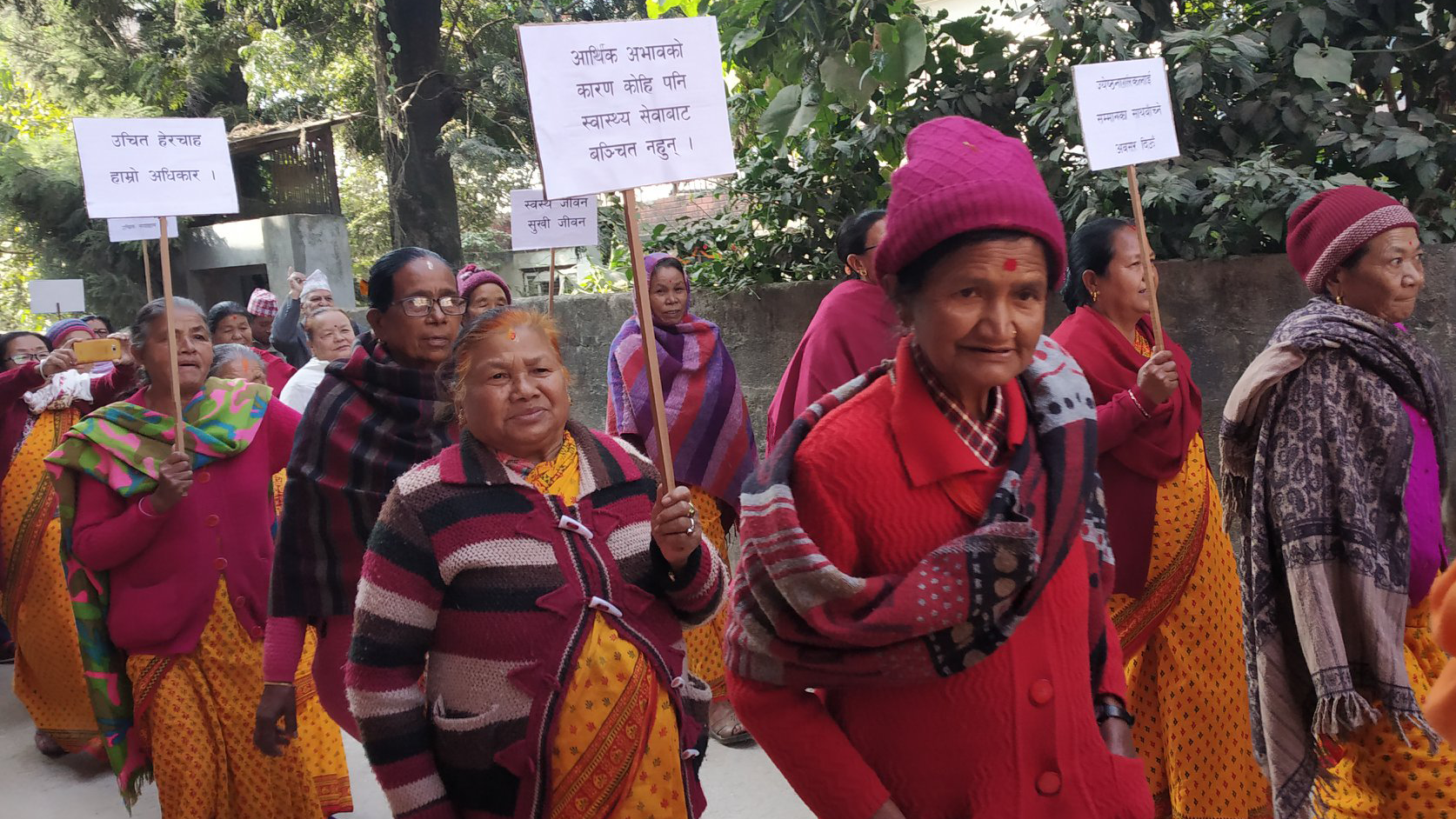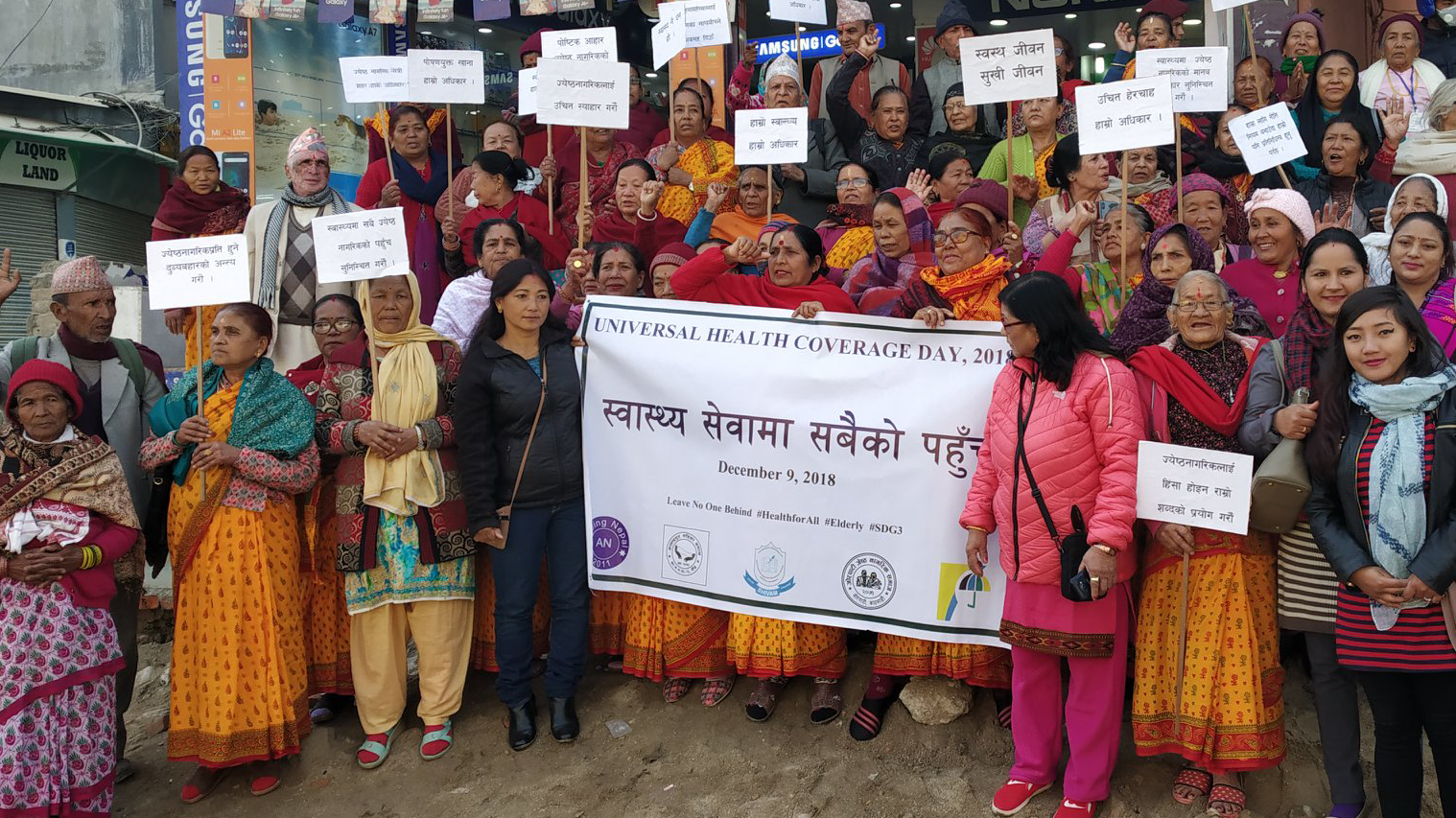On Universal Health Coverage Day that falls on 12 December, we speak with Sanju Thapamagar from Ageing Nepal and Camilla Williamson from HelpAge International about the barriers older people face to enjoying their right to health and how they are working to drive progress on this agenda at national and global levels.

Previous Universal Health Coverage day celebrations in Nepal. © Ageing Nepal
Sanju Thapamagar is Chief Executive of Ageing Nepal, one of the few organisations working for older people’s rights in the country. Sanju originally joined Ageing Nepal as a volunteer while studying her Bachelors in Sociology. She was offered a job and promoted to Programme Officer after a year. Eight years later she is running the organisation that focuses on promoting the rights of older people. Sanju is also Steering Member of Global Alliance for the Rights of Older Persons (GAROP).
Camilla Williamson is Global healthy ageing adviser at HelpAge. She has been working on ageing related policy, advocacy and research for over 10 years. Camilla leads HelpAge International’s work promoting Universal Health Coverage fit for an ageing world.
What challenges do older people face in accessing good quality health and care that meets their needs in Nepal?
Sanju: Day to day, working with older people, I’m aware of many things that are shaping their ability to enjoy good health and wellbeing. From whether they have access to enough food and water, safe shelter and an income, to whether they have people in their lives that they can rely on for company, friendship and support. Access to good quality health and care services is one of the priorities.
Being able to get the health and care services we need without worrying about the cost is something that one half of the world takes for granted. But for the other half, it’s a constant worry; for some a nightmare.
In my day-to-day work in Nepal, I meet many older people for whom this is true. The reasons are varied. Some aren’t aware of what they’re entitled to because, information has simply not reached them. For the 80 per cent of older people living in rural areas, the health post is too far and too hard or expensive to get to. Even if they do reach the facilities, they often find what they need isn’t available. The health staff don’t have the right training – or worse they consider their symptoms of sickness as “normal signs of ageing”. In Nepal, there are just nine geriatricians, six geriatric nurses and one geriatric physiotherapist. So, it’s hard to get good quality services for older people.
Often older people report that when they go to the health posts, there is no medicine available, or even if it is, they can’t afford it. Families face choosing between the health of their child or the health of their parent.
But there are also underlying social taboos or traditions that prevent people from seeking health services. Many rural older people prefer traditional medicine. Older people in Nepal – especially older women – also find it very hard to talk about sexual and reproductive health needs or to seek help. They end up not sharing problems, such as uterus prolapse, until it becomes life threatening.

Universal Health Coverage day celebrations in Nepal. © Ageing Nepal
What is Ageing Nepal doing to promote access to good quality health and care services for older people?
Sanju: Health and care issues of older people is one of our major areas of concern. We are continuously working for better health and wellbeing of older women and men since our establishment in 2011. We engage in advocacy, campaign and research all contributing to promoting Universal Health Coverage for older people. Universal health coverage is about everyone, everywhere being able to access good quality health and care services they need without suffering financial hardship. The Government of Nepal are committed to achieving Universal Health Coverage but more needs to be done to ensure it meets the needs and upholds the rights of older people.
We have been working with older people to advocate for Universal Health Coverage fit for an ageing world for the last six years, including on Universal Health Coverage Day which falls on 12 December. We conduct health camps; awareness sessions on different health and wellbeing issues facing older people and their rights and entitlements; we share information and education materials to promote demand for services; do social and media mobilization through TV, radio and publish articles; and we support older people’s voices to be heard through holding rallies, delivering campaign calls in different ways, and holding meetings with government.
This year we will be running a free eye camp for 100 older people on Universal Health Coverage Day and holding an awareness building session on older people’s right to health and engaging with the media. Universal Health Coverage is the only hope for those most at risk, particularly older people in developing countries like Nepal to access the quality health and care services they need. Rising health care costs and limited income at old age are creating a big gap in access to health and care service and there are so many barriers to older people accessing services that meet their needs. Investment in Universal Health Coverage is the best way of achieving health for all. We really hope that Ageing Nepal’s activity is a clarion call to galvanize people and to push the government to deliver Universal Health Coverage that meets the needs and upholds the rights of older people.
How are HelpAge International and partners in other countries supporting progress on Universal Health Coverage fit for an ageing world?
Camilla: Primary health care and community-based approaches are a central focus of our work. Community-based services offer us the best chance of ensuring everyone, everywhere, can access the care they need, yet they get little funding compared to the challenge they face in keeping people well. Which is the goal we need to focus on. In many countries, we are working with older people’s associations to do just this. For example, in our SANAII project in Vietnam, Bangladesh, Cambodia and Indonesia we worked with older people to promote their engagement in health promotion activities and supported them to be empowered to act on their own health and to strengthen linkages with community-based health providers. This increased health awareness and health-seeking among older people and improved responsiveness of health workers and services to their needs.
We have similar projects in Mozambique, Kenya, Ethiopia and many other settings, with equally positive impact. Change needs to be driven from the bottom-up and we need to ensure services that promote health and wellbeing throughout our lives are delivered as close to home as possible to reach everyone, everywhere.
